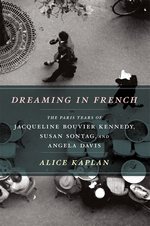Dreaming in French again
For her column at Bookslut, Jenny McPhee considers the fantasy of the “intellectual and sensual super-sophistiquée” in twentieth-century Paris—and reviews the ever-expanding body of literature dedicated to pursuit of this theme. Among it? Alice Kaplan’s Dreaming in French: The Paris Years of Jacqueline Bouvier Kennedy, Susan Sontag, and Angela Davis, which focuses on each woman’s time abroad, articulating the influence French culture exerted on their then-burgeoning womanhood and identities (among others) as writer, editor, activist, debutante, and icon.
McPhee notes in particular of Davis a thread that the three women hold in common—how their time in Paris left indelible marks on their self-perception:
Davis spent her junior year in Paris, the only black student of forty-six in the Hamilton program. Very familiar with the work of Rimbaud, Baudelaire, Proust, Camus, and Sartre, she was one of six students advanced enough for an intensive course in contemporary literature at the Sorbonne. While she was in France, four Birmingham girls—friends and neighbors of Davis’s—died when a bomb exploded in a Baptist Church, and Kennedy was assassinated.
In 1965, after graduating from Brandeis, she studied in Frankfurt with the social critic and philosopher Theodor Adorno, then worked on her PhD with the political theorist Herbert Marcuse at University of California, San Diego. Much of her reading during the years she was developing her own radical political philosophy was in French: Jean-Paul Sartre on colonialism and post-colonialism, Pierre Vidal-Naquet and Henri Alleg on torture, Henri Lefebvre and Louis Althusser on Marxist theory, and Daniel Guérin on anarchism.
Later, when Davis was imprisoned for her alleged role in a California courtroom shooting, four hundred French intellectuals, including Daniel Guérin, Jacques Derrida, Marguerite Duras, Julia Kristeva, and Roland Barthes, signed a letter demanding her release. Alain Robbe-Grillet, Michel Foucault, Louis Aragon, and Pablo Picasso wrote another letter of protest to Governor Ronald Reagan. In 1971, sixty thousand people marched in Paris for her liberation. Angela Davis’s story, writes Kaplan, itself became mythic.
To read more about Dreaming in French, click here.
